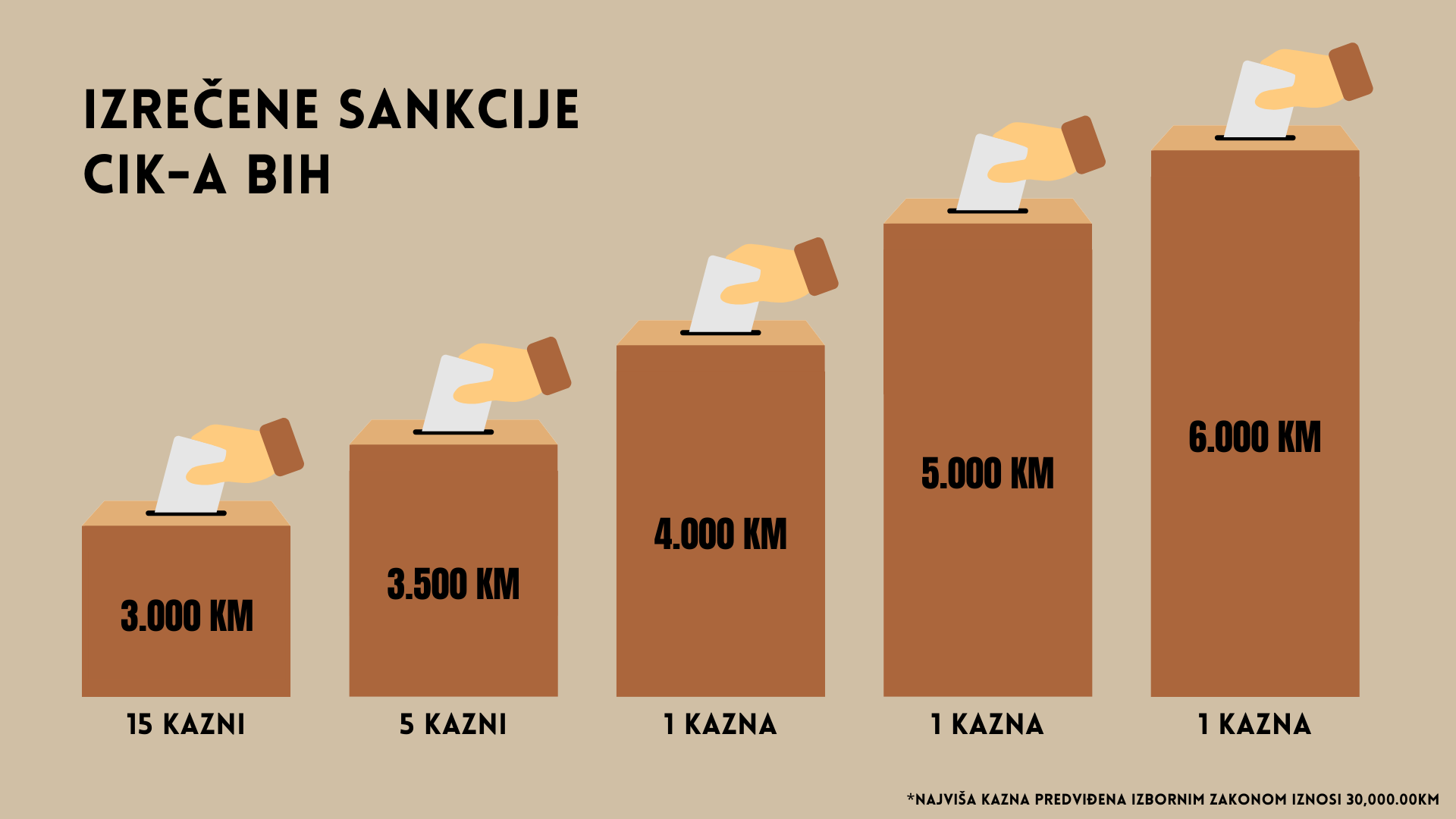This post is also available in: Bosnian
As well as details about the complaints, the CEC also decided to publicly disclose the identities of those who filed them.
Damjan Ozegovic of Transparency International in Bosnia and Herzegovina said that such a course of action by the top election institution is problematic for several reasons.
“Primarily because citizens, being unaware of all the circumstances, might suffer retaliation, discrimination or other harmful acts,” Ozegovic said.
The CEC published a list of objections containing more than 200 reports. Half of those were lodged by political parties, and the rest by members of the public. The CEC decided to disclose the identities of all the complainants, apart from six who specifically asked to remain anonymous.
One of the people on the list told Detektor that he has already asked the CEC to remove his data from its website. Several others declined to speak publicly about the disclosure of their data.
Information including the complainants’ first and last name, as well as the municipality in which the irregularity allegedly happened, makes it relatively easy, with the help of social media, to find the people who reported the irregularities.
 Ilustration. Photo: BIRN BiH
Ilustration. Photo: BIRN BiH
Hasan Kamenjakovic of electoral rights NGO Pod Lupom thinks that the CEC is not trying hard enough to protect the identity of the people who filed the complaints.
“The role of the public is invaluable, because citizens know best what is happening in their local communities and have a certain power in their hands,” he explained.
As well as observing the polls on election day, Pod Lupom closely follows pre-election processes and reports irregularities that its observers have seen for themselves or have been reported to the NGO by the public.
Kamenjakovic said that the CEC has also made people’s private data public before.
“It also happened during the previous election cycle that the CEC stated the first and last name of a complainant alongside an anonymous report about election irregularities. It is now happening again, because, according to the latest amendments to the Election Law of Bosnia and Herzegovina, the CEC must publicly disclose its register of objections and complaints,” he explained.
The amendments to the Election Law say that the CEC must publish, in a timely manner, information about objections and complaints that have been filed, as well as its own decisions, and that it must also keep a special register of such reports.
The High Representative left it to the CEC to decide how exactly to do this.
CEC members contacted by Detektor did not want to talk about how people’s private information was published.
Responding to Detektor’s written query, the CEC explained that, in line with the Election Law, objections were to be submitted to all parties mentioned in the objection itself, including all the information contained in the objection, such as people’s identity or contact details – “apart from in cases in which a complainant is insisting on his complaint being anonymous, in which case data referring to identity and email address are protected in some way”.
However, election monitoring experts told Detektor that this practice might deter members of the public from reporting electoral irregularities for fear that they might suffer repercussions.
“Disclosing complainants’ data to the political bodies that they reported – and not only to those they reported, but to the public in general, as the data is publicly readout at sessions that are broadcast live – is problematic for a number of reasons, primarily because citizens, being unaware of all the circumstances, might suffer retaliation, discrimination or other harmful actions,” Ozegovic said.
According to the amendments to the Election Law in March this year, a pre-election campaign means all campaign activities in the period between the announcement of elections and the official start of the election campaign – in other words, from May to September this year, when the campaign officially starts for the October 6 municipal election. Until then, parties, candidates and their supporters are banned from electioneering and promoting their political programmes to the public.
If a candidate or party supporters promote candidates during that period, they can be fined up to 30,000 Bosnian marks (15,340 euros).
The CEC has handed down decisions in more than 20 cases so far, imposing various penalties, but most often the lowest one, 3,000 marks (1,534 euros). Only three higher penalties – 4,000, 5,000 and 6,000 marks – were imposed.
The CEC has so far not imposed the highest penalty for violations during a pre-election campaign.
 Ilustration. Photo: BIRN BiH
Ilustration. Photo: BIRN BiH
Pod Lupom encourages members of the public to report all the election irregularities they detect. The NGO is also encouraging every voter to act as an observer of the election process in order to strengthen electoral integrity in general.
Kamenjakovic said that Pod Lupom received nearly 2,000 reports from the public concerning irregularities observed during previous election cycles. Such work is very important in order to ensure fair elections, he said.
“Thanks to anonymous reports by citizens filed to the Pod Lupom Coalition, political bodies have faced sanctions based on those that contained elements of violations of electoral rules,” he says.
He said that anonymity must be guaranteed by law so that members of the public are not deterred from monitoring and reporting irregularities.
“If a functional mechanism of anonymous reporting was set up, it might encourage citizens to report election irregularities without fear, thus increasing the number of such reports and ensuring freer and fairer elections,” Kamenjakovic said.
Transparency International is one of the organisations most actively involved in monitoring electoral processes and reporting irregularities. Ozegovic said that based on its experience, it’s clear that voters don’t trust fully the CEC’s mechanisms.
“Transparency International has had a lot of encounters with citizens who, knowing that their data will be made public or fearing that this might happen, turned to our organisation asking us to forward their reports to the Central Election Commission,” Ozegovic said.
He said that filing complaints through organisations such as Transparency International is one of the easier ways for voters to file such complaints, because it guarantees them security – but direct reporting to the CEC would be preferable.
“Direct reporting to the CEC should be made a priority by simplifying and speeding it up, both for the sake of the institutions and the public, but unfortunately, that is not how things are,” Ozegovic said.
He added that the role of the public in the process of highlighting irregularities is vitally important to protect people’s electoral rights. The practice of disclosing complainants’ identities, with or without their knowledge, could negatively affect this.
“I think we don’t even need to mention the importance of citizens being engaged and reporting , because individual citizens are the ones who detect everyday irregularities in the field, and in terms of numbers, they are an invaluable resource. That’s exactly why citizens should be encouraged and protected when it comes to reporting,” Ozegovic said.

